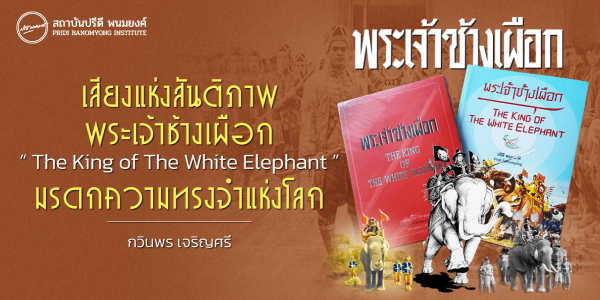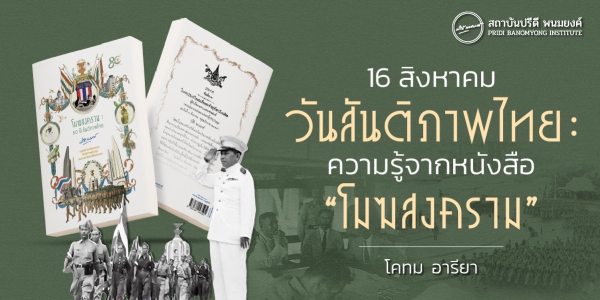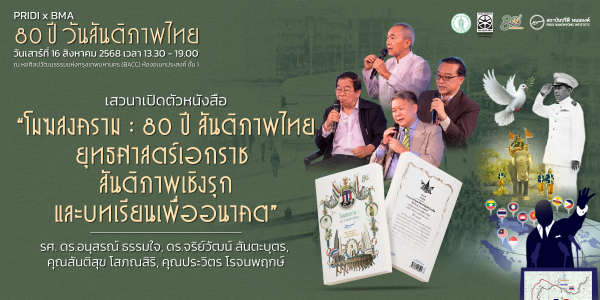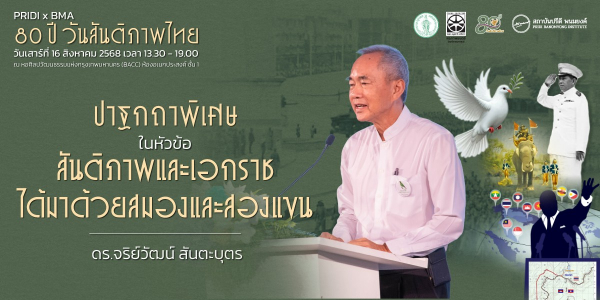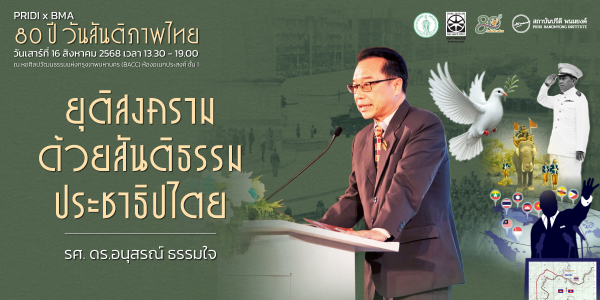Focus
- นายปรีดี พนมยงค์ บันทึกรายละเอียดท่าทีของประเทศฝ่ายสัมพันธมิตร 5 ประเทศ ประกอบด้วยบริเตนใหญ่ (หรืออังกฤษ) ฝรั่งเศส สหรัฐอเมริกา จีน และสหภาพโซเวียตที่มีต่อประเทศไทย
- นอกจากการบันทึกเหตุการณ์นายปรีดี พนมยงค์ ได้ใช้หลักฐานชั้นต้น เช่น สำเนาโทรเลข
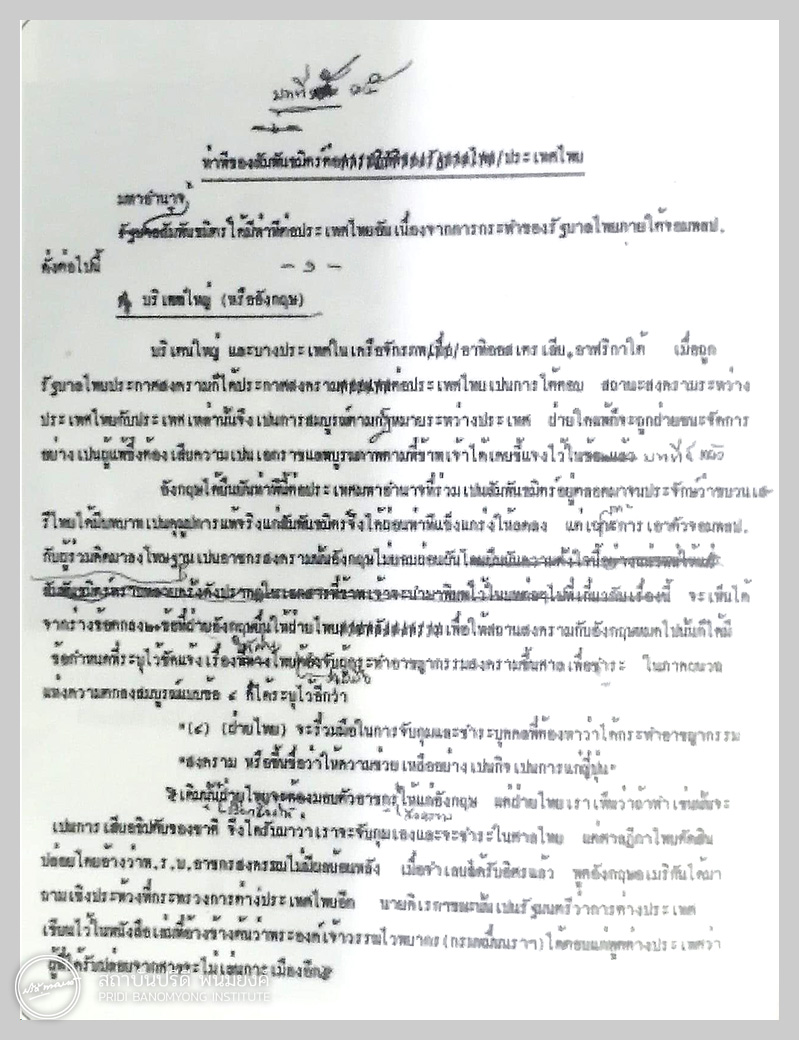
มหาอำนาจสัมพันธมิตรได้มีท่าทีต่อประเทศอันเนื่องจากการกระทำของรัฐบาลไทยภายใต้จอมพล ป. ดังต่อไปนี้
-1-
บริเตนใหญ่ (หรืออังกฤษ)
บริเตนใหญ่และบางประเทศในเครือจักรภพ อาทิ ออสเตรเลีย, อาฟริกาใต้ เมื่อถูกรัฐบาลไทยประกาศสงครามก็ได้ประกาศสงครามต่อประเทศไทยเป็นการโต้ตอบ สถานะสงครามระหว่างประเทศไทยกับประเทศเหล่านั้น จึงเป็นการสมบูรณ์ตามกฎหมายระหว่างประเทศ ฝ่ายใดแพ้ก็จะถูกฝ่ายชนะจัดการอย่างเป็นผู้แพ้ ซึ่งต้องเสียความเป็นเอกราชและบูรณภาพตามที่ข้าพเจ้าได้เคยชี้แจงไว้ในบทที่ 9 แล้ว
อังกฤษได้ยืนยันท่าทีนี้ต่อประเทศมหาอำนาจที่ร่วมเป็นสัมพันธมิตรอยู่ตลอดมา จนประจักษ์ว่า ขบวนการเสรีไทยได้มีบทบาทเป็นคุณูปการแท้จริงแก่สัมพันธมิตรจึงได้ผ่อนท่าทีแข็งแกร่งให้ลดลง แต่เฉพาะการเอาตัวจอมพล ป. กับผู้ร่วมคิดมาลงโทษฐานเป็นอาชญากรสงครามนั้น อังกฤษไม่ยอมผ่อนผัน จะเห็นได้จากร่างข้อตกลง 21 ข้อที่ฝ่ายอังกฤษยื่นให้ฝ่ายไทย เพื่อให้สถานะสงครามกับอังกฤษหมดไปนั้น ก็ได้มีข้อกำหนดที่ระบุไว้ชัดแจ้งเรื่องให้ฝ่ายไทยร่วมมือจับผู้กระทำอาชญากรรมสงครามขึ้นศาลเพื่อชำระในภาคผนวกแห่งความตกลงสมบูรณ์แบบข้อ 4 ได้ระบุไว้อีกว่า
“(4) (ฝ่ายไทย) จะร่วมมือในการจับกุมและชำระบุคคลที่ต้องหาว่าได้กระทำอาชญากรรมสงคราม หรือขึ้นชื่อว่าให้ความช่วยเหลืออย่างเป็นกิจเป็นการแก่ญี่ปุ่น”
เดิมนั้นเรียกร้องให้ฝ่ายไทยมอบตัวอาชญากรสงครามให้แก่อังกฤษ แต่ฝ่ายไทยเราเห็นว่าถ้าทำเช่นนั้นจะเป็นการเสียอธิปไตยของชาติ จึงได้รับมาว่าเราจะจับกุมเองและจะชำระในศาลไทย แต่ศาลฎีกาไทยตัดสินปล่อย โดยอ้างว่า พ.ร.บ. อาชญากรสงครามไม่มีผลย้อนหลัง เมื่อจำเลยได้รับอิสรภาพแล้ว ทูตอังกฤษอเมริกันได้มาถามเชิงประท้วงที่กระทรวงการต่างประเทศไทยอีก นายดิเรกฯ ขณะนั้นเป็นรัฐมนตรีว่าการต่างประเทศเขียนไว้ในหนังสือเล่มที่อ้างข้างต้นว่า พระองค์เจ้าวรรณไวทยากร (กรมหมื่นนราฯ) ได้ตอบแก่ทูตต่างประเทศว่า ผู้ที่ได้รับการปล่อยจากศาลจะไม่เล่นการเมืองอีก
-2-
สหรัฐอเมริกา
รัฐบาลสหรัฐอเมริกาภายใต้ประธานาธิบดีรูสเวลท์ถือว่า “ประเทศไทย” มิใช่เป็น “ประเทศศัตรู” หากเป็น “ประเทศที่ถูกศัตรูยึดครอง” ที่จะต้องได้รับการปลดแอกจากสัมพันธมิตร อันเป็นท่าทีที่สหรัฐถือมาตั้งแต่ญี่ปุ่นกรีธาทัพเข้าประเทศไทยเมื่อวันที่ 8 ธันวาคม พ.ศ. 2484 และสหรัฐฯ ถือท่าทีนี้ต่อมา แม้ถูกรัฐบาลไทยสมัยนั้นประกาศสงครามกับตน แต่ตนก็ไม่ประกาศสงครามโต้ตอบ ท่าทีนี้รัฐมนตรีว่าการต่างประเทศอเมริกันได้รับอนุญาตจากรัฐบาลให้แจ้งแก่ข้ารัฐการทหารและพลเรือนที่เกี่ยวข้อง และเมื่อประธานาธิบดีรูสเวลท์ จะเดินทางไปประชุมกับสตาลินและเชอร์ชิลล์ที่เมือง “ยาลตา” (Yalta) เมื่อเดือนมกราคม ค.ศ. 1945 ก็ได้สั่งให้เจ้าหน้าที่ทำบันทึกเกี่ยวกับฐานะอนาคตของประเทศไทย เพื่อขอให้อังกฤษและโซเวียตมีท่าทีต่อประเทศไทยตรงกับสหรัฐอเมริกา ดังปรากฏในบันทึกต่อไปนี้
892.01/1-1345
Memorandum Prepared in the Division of Southwest Pacific Affairs
Washington, January 13, 1945.
MEMORANDUM FOR THE PRESIDENT
(for possible use in discussion with Mr. Churchill and Marshal Stalin)
Subject : Future Status of Thailand.
British policies towards Thailand are divergent from ours. The British regard Thailand as an enemy and it is their view:
1. That Thailand’s postwar independence should be conditioned on its acceptance of “special arrangements for security or economic collaboration. … within an international system.”
2. That the peninsula of Thailand from Malaya to about 12 ํ north latitude should be considered a vital strategic area and its defense under international security arrangements be undertaken by a protecting power or by an international consortium. This is reported to be the opinion of Mr. Churchill. Such action might substantially impair Thai administrative rights in the area.
3. That actual military government will not be needed, perhaps in combat zones. However, they believe that an Allied Control Commission should be established in Thailand, which should be continued for some time.
4. That they should not deal at the present time with any Thai Government.
In contrast, we do not regard Thailand as an enemy but as an enemy occupied country. We recognize the Thai Minister in Washington as “Minister of Thailand” with a status similar to that of the Danish Minister. We favor a free, independent Thailand, with, sovereignty unimpaired and ruled by a government of its own choosing. Thailand is the one country in Southeast Asia which was still independent before the war. We believe that it would be prejudicial to American interests throughout the Far East if, as the outcome of the war in which we will have had the major part in defeating Japanese aggression, Thailand should be deprived of any of its prewar territory or should have its independent status impaired. The history of European pressure on Thailand and of European acquisition of territory in Southeast Asia is vivid in Asiatic memories. This Government cannot afford to share responsibility in any way for a continuance towards Thai prewar imperialism in any guise.
Within Thailand, the administration which first yielded to Japan and which was notoriously collaborationist has been replaced by an administration-largely controlled by Pradist, present Regent, most respected of Thai leaders and opponent of Japan from the first. American contact has been established with Pradist who is actively siding Allied intelligence work and who has expressed his desire that Thailand enter the war against Japan and that the Thai army fight by the side of the Allied.
It is the view of the Department that an effort should be made to persuade the British to alter their plans so that they are not inconsistent with our own. It is believed that if Thailand joins us in the war against Japan she should be treated as a liberated country and her government be recognized, at least provisionally. Although there are disadvantages from a political viewpoint in having American troops, except where militarily essential, participate in the recovery of European colonial areas, there would be advantages from a political view point in having American troops under independent American command responsible for the
liberation of Thailand, rather than having Thailand occupied as enemy territory by British forces. Whether or not American forces should be used in Thailand, however, is a question which would presumably be decided in the light of overall strategic considerations.
Attached is a brief memorandum regarding the Regent Pradist.
นอกจากนั้นประธานาธิบดีรูสเวลท์ยังได้มีคำสั่งให้กระทรวงการต่างประเทศอเมริกันแจ้งแก่รองอธิบดีสำนักกิจการยุทธศาสตร์ ดังต่อไปนี้
THAILAND
INTEREST OF THE UNITED STATES IN QUESTION OF RECOGNIZING
A FREE THAI MOVEMENT
892.01/32
The Secretary of State to the Deputy Director of the Office
of Strategic Services (Goodfellow)
WASHINGTON, August 26, 1943.
My Dear Colonel Goodfellow : In reply to your oral inquiry of August 4 relating to possible American operations conducted in connection with a Free Thai Movement, the position of the Department of State is as follows:
The United States recognizes Thailand as an independent state which is now under the military occupation of Japan. This Government does not recognize the Thai Government as it is now constituted; but this Government has refrained from declaring war on Thailand, has continued to recognize as “Minister of Thailand” the Thai Minister in Washington who has denounced his Government’s cooperation with Japan, and has sympathetically regarded a Free Thai movement in which he is prominent.
The Government of the United States looks forward to the re-establishment of Thailand's independence as quickly as possible. Available information indicates that there remain in the present Thai Government a number of officials who opposed the capitulation of that Government to Japanese pressure. It is understood that Luang Pradist Manudharm (known also as Nai Pridi Bhanomyong), a member of the Council of Regents, is one of these officials and that he has participated prominently in a secret movement which aims to restore the Government as it was constituted prior to the Japanese invasion.
In the light of this understanding Luang Pradist Manudharm is presumed by the Government of the United States to represent a continuity in the Government of Thailand as it was constituted prior to the defection of the Thai Prime Minister (1a) to the Japanese at the time of the Japanese invasion and to be one of the outstanding leaders in the movement for Thai independence. Accordingly, until this Government has indications to the contrary from the Thai people, it feels warranted, without in any way committing itself in respect to the future, in regarding Luang Pradist as one of the leading representatives in Thailand of the Thai nation.
The attitude of this Government, as above outlines, is a provisional position pending a free expression of the wishes of the Thai people following the liberation of Thailand by United Nations forces. The efforts of the Government of the United States are and should be limited to assisting the Thai people to restore a native regime capable of discharging its responsibilities and free from foreign control. The final choice of the leaders of such a government is a matter for the Thai people alone to decide.
It is believed that this will give you information you wished.
Sincerely yours,
Cordell Hull.
คำแปลภาษาไทย
ที่ 892.01/32
จากรัฐมนตรีว่าการกระทรวงการต่างประเทศ
ถึงรองผู้อำนวยการสำนักงานยุทธศาสตร์ (กูดเฟลโลว์)
วอชิงตัน, 26 สิงหาคม 1943
พันเอกกูดเฟลโลว์ที่รัก ในการแถลงตอบข้อถามของท่านด้วยวาจาเมื่อวันที่ 4 สิงหาคม เกี่ยวกับปฏิบัติการอันพึงเป็นไปได้ของฝ่ายอเมริกันกับขบวนการเสรีไทยนั้น กระทรวงการต่างประเทศชี้แจงท่าทีของตนดังต่อไปนี้
สหรัฐอเมริกาถือประเทศไทยว่าเป็นรัฐเอกราชที่บัดนี้ตกอยู่ภายใต้การยึดครองด้วยกำลังทหารญี่ปุ่น รัฐบาลนี้ (สหรัฐอเมริกา) ไม่รับรองรัฐบาลไทยที่ประกอบอยู่ในปัจจุบัน (รัฐบาลจอมพล ป. พิบูลสงคราม) แต่รัฐบาลนี้ (สหรัฐอเมริกา) ยับยั้งการประกาศสงครามต่อประเทศไทยไว้ และคงรับรอง “อัครราชทูตไทยประจำกรุงวอชิงตัน” เป็น “อัครราชทูตของประเทศไทย” ต่อไป อัครราชทูตผู้นี้ (ม.ร.ว.เสนีย์ ปราโมช) ได้ประณามความร่วมมือของรัฐบาลไทยกับญี่ปุ่น และ (สหรัฐฯ) ได้นับถือด้วยความเห็นอกเห็นใจต่อขบวนการเสรีไทยซึ่งอัครราชทูตคนนั้น (ม.ร.ว.เสนีย์ ปราโมช) เป็นบุคคลสำคัญ
รัฐบาลสหรัฐอเมริกาตั้งใจรอคอยการสถาปนาเอกราชของประเทศไทยโดยเร็วที่สุดเท่าที่จะเป็นไปได้จากข่าวสารต่าง ๆ ที่ได้รับแสดงให้เห็นว่า ในรัฐบาลไทยปัจจุบันก็ยังมีข้าราชการส่วนหนึ่งที่คัดค้านไม่เห็นด้วยกับการที่รัฐบาลไทยยอมจำนนต่อการกดดันของฝ่ายญี่ปุ่น เป็นที่ทราบกันดีว่า ในบรรดาข้าราชการดังกล่าวนี้ มีหลวงประดิษฐ์มนูธรรม (หรือที่รู้จักกันในนามนายปรีดี พนมยงค์) ผู้สำเร็จในคณะผู้สำเร็จราชการแทนพระองค์รวมอยู่ด้วยผู้หนึ่งและยังได้ทราบต่อไปอีกว่า ผู้นี้ได้มีส่วนอย่างสำคัญในการร่วมมือในขบวนการลับที่มีจุดประสงค์เพื่อฟื้นขึ้นซึ่งรัฐบาลไทยที่เคยเป็นอยู่ก่อนหน้าการรุกรานของญี่ปุ่น
ด้วยความกระจ่างแจ้งเช่นนี้ รัฐบาลแห่งสหรัฐอเมริกาจึงถือว่า หลวงประดิษฐ์มนูธรรมเป็นตัวแทนแห่งการสืบต่อของรัฐบาลแห่งประเทศไทย ตามที่เป็นอยู่ก่อนหน้าที่นายกรัฐมนตรีไทยสมัยนั้น (จอมพล ป. พิบูลสงคราม) จะไปเข้ากับฝ่ายญี่ปุ่นในตอนที่ญี่ปุ่นบุกและยอมรับว่า (หลวงประดิษฐ์) เป็นผู้นำคนสำคัญในขบวนการเพื่อเอกราชของชาติไทย ด้วยเหตุนี้ ตราบเท่าที่รัฐบาลนี้ (สหรัฐอเมริกา) มิได้รับแจ้งการตรงข้ามจากประชาชนไทย จึงเป็นประกันได้โดยไม่ผูกสมัครรัฐบาล ส.ร.อ. ในอนาคตในการถือว่าหลวงประดิษฐ์เป็นผู้แทนชั้นนำคนหนึ่งของประชาชนไทยในประเทศไทย
ท่าทีของรัฐบาล (สหรัฐอเมริกา) ดังที่ได้กล่าวมาแล้วข้างต้นนี้ เป็นท่าทีชั่วคราวระหว่างการแสดงออกอย่างเสรีแห่งความปรารถนาของประชาชนไทย ภายหลังจากกองกำลังแห่งสหประชาชาติได้ทำการปลดปล่อยประเทศไทยแล้ว ความพยายามของรัฐบาลสหรัฐอเมริกาที่เป็นอยู่และที่พึงเป็นจะจำกัดเพียงแต่การให้ความช่วยเหลือแก่ประชาชนไทยในการสถาปนารัฐบาลของประเทศตน ที่สามารถดำเนินความรับผิดชอบของตนและเป็นอิสระจากการควบคุมของต่างชาติ ส่วนการคัดเลือกผู้นำของรัฐบาลในบั้นปลายนั้น เป็นเรื่องที่ประชาชนไทยเท่านั้นจะเป็นผู้วินิจฉัย
เป็นที่เชื่อได้ว่า คำชี้แจงนี้คงจะให้ความกระจ่างแก่ท่านได้ตามที่ต้องการ
ด้วยความนับถือ
(ลงนาม) คอร์เดลล์ ฮัลล์
(ร.ม.ต.ว่าการต่างประเทศ)
ในเรื่องดินแดนที่ไทยได้จากฝรั่งเศสโดยญี่ปุ่นเป็นผู้ไกล่เกลี่ยก็ดี หรือได้ไปในระหว่างสงครามก็ดี สหรัฐได้ยืนยันไม่รับรองคือ ให้ไทยมีดินแดนเท่าที่เป็นอยู่เมื่อก่อนสงครามโลกครั้งที่ 2 แต่ไม่ตัดสิทธิที่รัฐบาลไทยภายหลังสงครามจะขอเจรจาแก้ไขปรับปรุงเส้นเขตแดนที่เป็นธรรมกับฝรั่งเศส ดั่งปรากฏในเอกสารทางอเมริกันหลายฉบับ
ส่วนอาชญากรสงครามนั้น สหรัฐยืนยันให้รัฐบาลไทยภายหลังสงครามจับตัวเอาขึ้นศาลชำระ อย่างเดียวกับที่อังกฤษและจีนมีท่าทีเช่นนั้น
-3-
จีน
แม้รัฐบาลไทยไม่ประกาศสงครามต่อจีนโดยตรง แต่จีนถือว่ามีสถานะสงครามเกิดขึ้นจากการปฏิบัติทางทหารของไทยในแคว้นฉานที่ขับไล่กองทหารจีนและการที่เครื่องบินไทยได้ทิ้งระเบิดบริเวณชายแดนจีน อีกทั้งการที่รัฐบาลไทยรับรองรัฐหุ่นมานจูกัวและรัฐบาลหุ่นจีนของวังจิงไว เป็นการปฏิบัติไปอย่างชนิดที่จีนถือว่าเป็นศัตรูต่อจีนทั้งชาติ ดั่งนั้นจีนจะยกกองทัพเข้ามารบในประเทศไทย ตามที่สัมพันธมิตรในชั้นแรกมอบให้ยุทธภูมิไทยขึ้นอยู่กับเจียง ไคเช็คผู้บัญชาการทหารสูงสุดของสัมพันธมิตรในยุทธภูมิจีนรวมทั้งไทยด้วย และจะยึดครองประเทศไทยไว้จนกว่าสัมพันธมิตรจะตกลงกันเกี่ยวกับปัญหาไทย และจะจับตัวคนไทยที่เป็นอาชญากรสงครามไปชำระที่ศาลอาชญากรสงครามของสัมพันธมิตรเช่นเดียวกันกับอาชญากรสงครามญี่ปุ่น
-4-
ฝรั่งเศส
ดังที่ได้กล่าวแล้วในบทที่ 4 ว่า คณะกรรมการแห่งชาติฝรั่งเศสภายใต้นายพลเดอโกลล์ ได้ปฏิเสธโดยไม่ยอมรับรู้ข้อตกลงที่โตเกียวซึ่งฝรั่งเศสภายใต้จอมพลเปแตง โอนดินแดนอินโดจีนบางส่วนคืนให้ไทย อีกทั้งถือว่าสถานะสงครามระหว่างฝรั่งเศสกับไทยคงมีอยู่นับตั้งแต่วันที่ 27 พฤศจิกายน พ.ศ. 2483
โดยเฉพาะผู้แทนฝรั่งเศสที่โตเกียวได้ทำหลักฐานกับญี่ปุ่นไว้ก่อนลงนามในข้อตกลงต่าง ๆ ซึ่งทำไปโดยฝ่ายญี่ปุ่นบังคับ
รัฐบาลฝรั่งเศสที่ตั้งขึ้นในปารีสภายหลังปลดแอกจากเยอรมันแล้ว ก็ยังได้มีบันทึกยืนยันไปยังสหรัฐอเมริกาถึงท่าทีของฝ่ายฝรั่งเศสตามความในบันทึกของอุปทูตอเมริกันที่พิมพ์ไว้ในบทที่ 4 แล้ว ก็ยังมีบันทึกอีกฉบับหนึ่งต่อไปนี้
751.92/8-2745 : Telegram
The Charge in France (Fullerton) to the Secretary of State
Paris, August 27, 1945 - 4 p.m.
(Received 6:30 p.m.)
5178. Department's instruction 1285, August 6, regarding French relations with Thailand was discussed today with De Lageneste* of Foreign Office. He stated that while no formal declaration of war has ever been made, France considers itself in state of hostilities with Thailand which may be considered to date from November 27, 1940 when Thai Air Force bombed Indo-Chinese territory. Present French Government does not recognize Convention of May 1941 and consequently considers state of hostilities arising from Thai Aggression never to have been terminated.
Moreover, French Government considers note of London Committee December 8, 1941 pledging assistance in Pacific to have applied to Thailand as ally of Japan.
De Lageneste stated categorically that French Government does not recognize any international agreements concluded by Vichy Government , including convention of May 9, 1941, between France and Thailand signed in Tokyo. In addition, French Government considers this convention doubly invalid because prior to it signature, there was at French insistence exchange of letters between French representative in Japan and Japanese Government recognizing that Convention was forced on France by Japan.
De Lageneste considers that recent proclamation of Regent of Thailand** (radio Bulletin 199, August 19) constitutes a renunciation of territorial gains since January 25, 1942 While admitting that selection of date of declaration of war against United States was natural in proclamation of this type. De Lageneste expressed hope that Thai Government would also specifically renounce territorial gains from Indochina acquired before the date.
De Lageneste was asked if French Government had considered taking any steps to regularize its relations with Thailand. He replied that he assumed such steps would be taken in due course but felt that they must be proceded by statement from Thai Government relinquishing territorial gains in Indochina and withdrawal of Thai forces to previous frontier.
FULLERTON
* Jean Lafon de Lageneste, Chief of the American affairs Section of the French Foreign Office.
** Dated August 16: it was included in note from the Thai Minister, Department of State Bulletin, August 19, 1945, p. 261.
-5-
สหภาพโซเวียต
แม้รัฐบาลไทยสมัยนั้นไม่ประกาศสงครามต่อโซเวียตโดยตรง แต่โซเวียตถือว่าไทยเป็นพันธมิตรของญี่ปุ่นและเป็นศัตรูต่ออังกฤษ ซึ่งเป็นสัมพันธมิตรของโซเวียต โซเวียตได้ถือท่าทีนี้ตลอดมาจนกระทั่งเสร็จสงครามแล้ว เมื่อฝ่ายไทยภายหลังสงครามสมัครเป็นสมาชิกสหประชาชาติ ผู้แทนโซเวียตได้ถามผู้แทนไทย ก่อนที่จะลงมติให้ว่า ฝ่ายไทยได้ทำความพอใจให้อังกฤษแล้วหรือยัง รวมทั้งได้เลิกกฎหมายคอมมิวนิสต์หรือยัง เมื่อฝ่ายไทยชี้แจงต่อผู้แทนโซเวียตว่า เราได้มีข้อตกลงสมบูรณ์แบบกับอังกฤษแล้ว และมีรัฐธรรมนูญประชาธิปไตยเต็มที่โดยให้สิทธิในการที่บุคคลมีเสรีนับถือลัทธิใด ๆ ก็ได้ จะตั้งพรรคการเมืองใด ๆ ก็ได้ โซเวียตจึงไม่ลงมติยับยั้งการสมัครของไทยเป็นสมาชิกสหประชาชาติ
ภาคผนวก
ภาพประกอบจากหนังสือโมฆสงคราม บันทึกสัจจะประวัติศาสตร์ที่ยังไม่เปิดเผยของรัฐบุรุษอาวุโส ปรีดี พนมยงค์
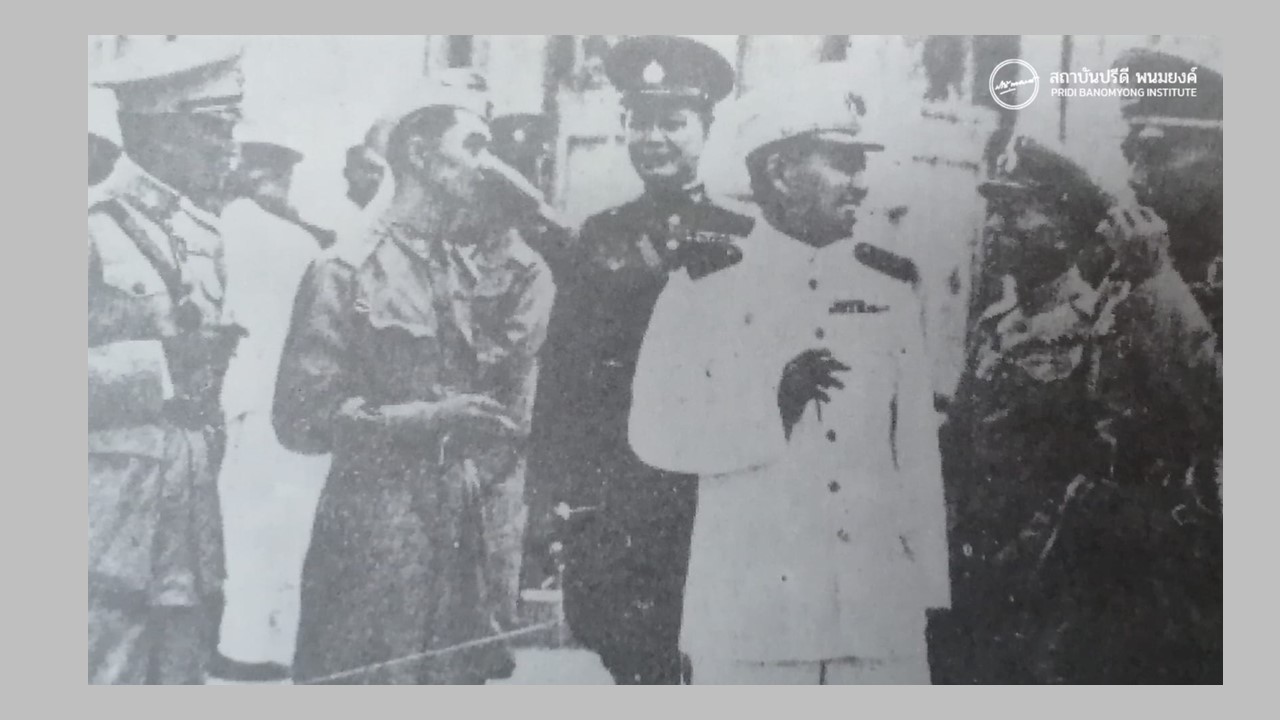
บรรดาหัวหน้าเสรีไทย (จากซ้ายไปขวา) พล.ต.อ.อดุล อดุลเดชจรัส, ม.ร.ว.เสนีย์ ปราโมช, พล.ท. สินาด โยธารักษ์, นายปรีดี พนมยงค์, พล.ร.อ.สินธุ กมลนาวิน, พล.อ.ท.เทวฤทธิ์ พันลึก
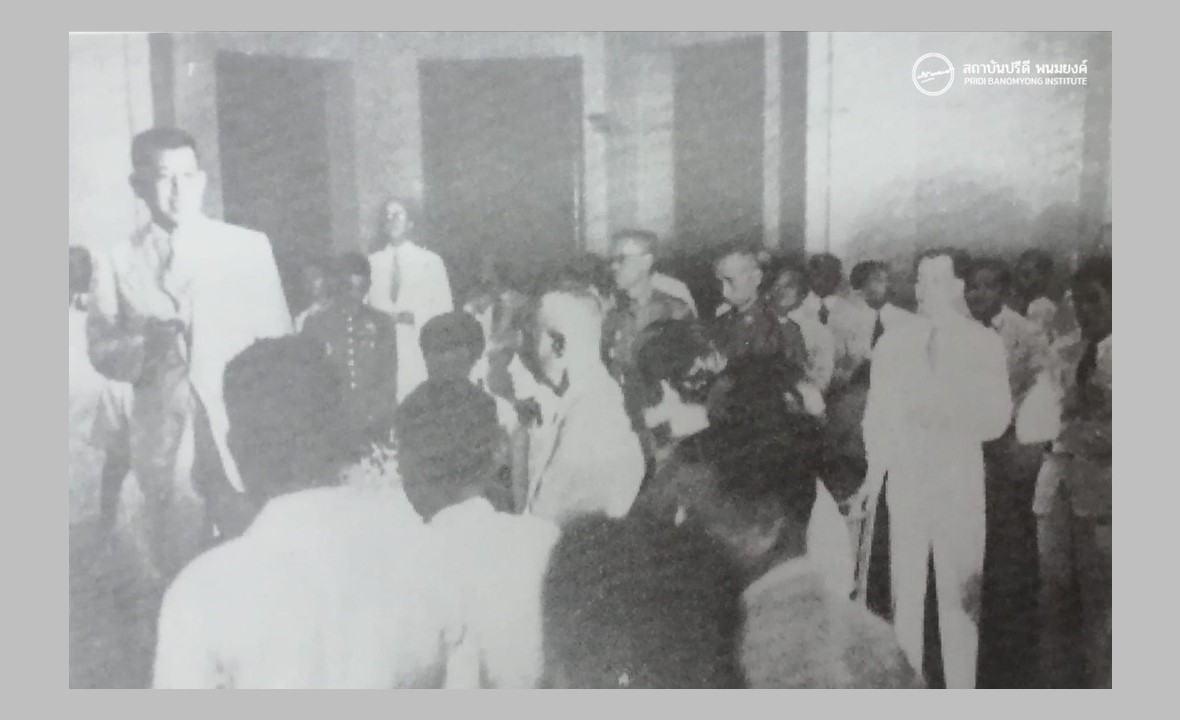
งานเลี้ยงฉลองสันติภาพ ณ ทำเนียบท่าช้าง เมื่อ 16 สิงหาคม 2488
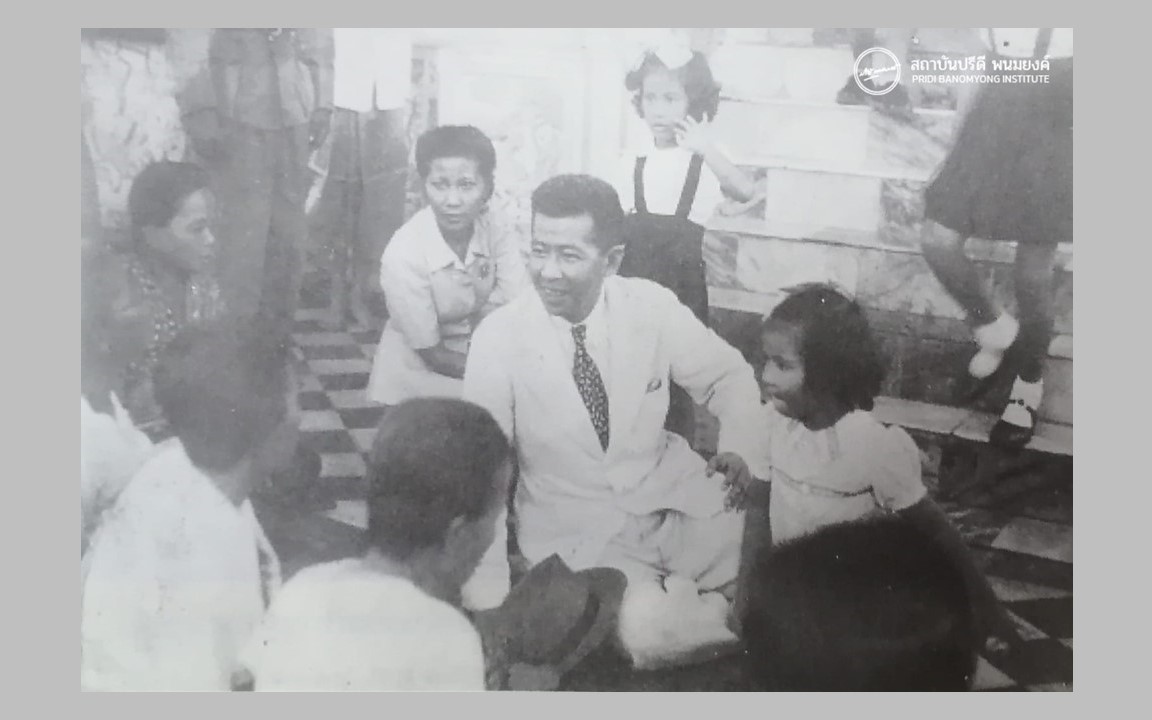
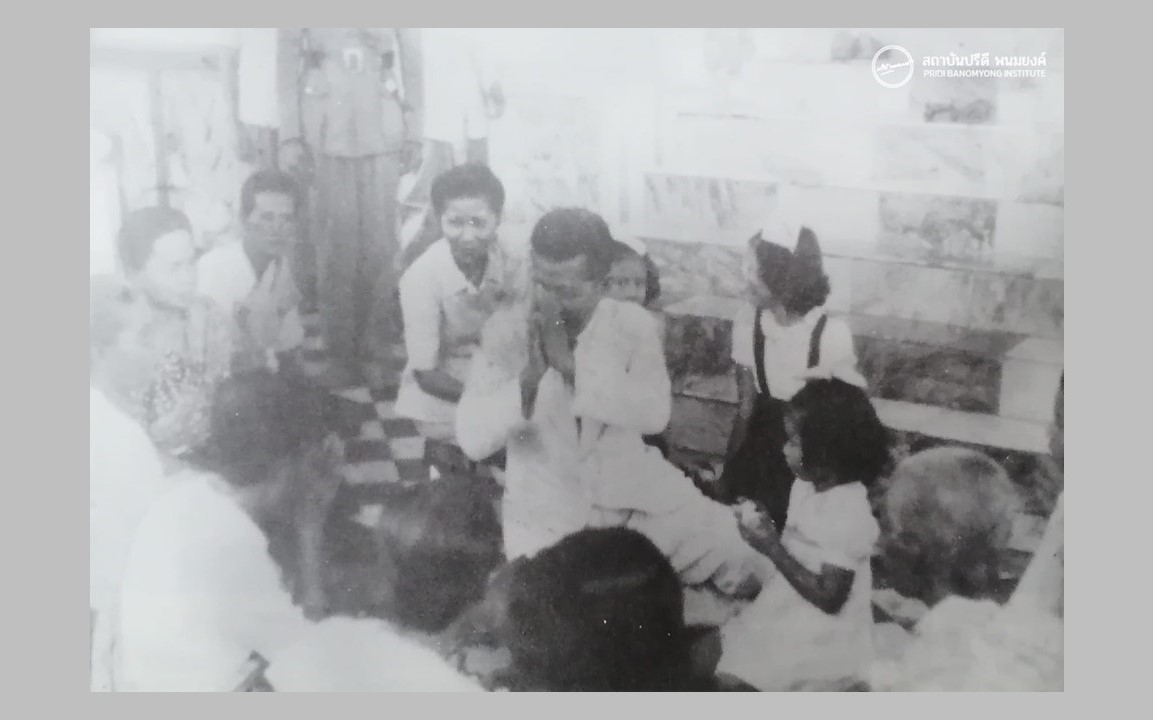
ทอดกฐินที่จังหวัดพระตระบอง เมื่อครั้งไปเยือนกัมพูชาเมื่อ พ.ศ. 2488
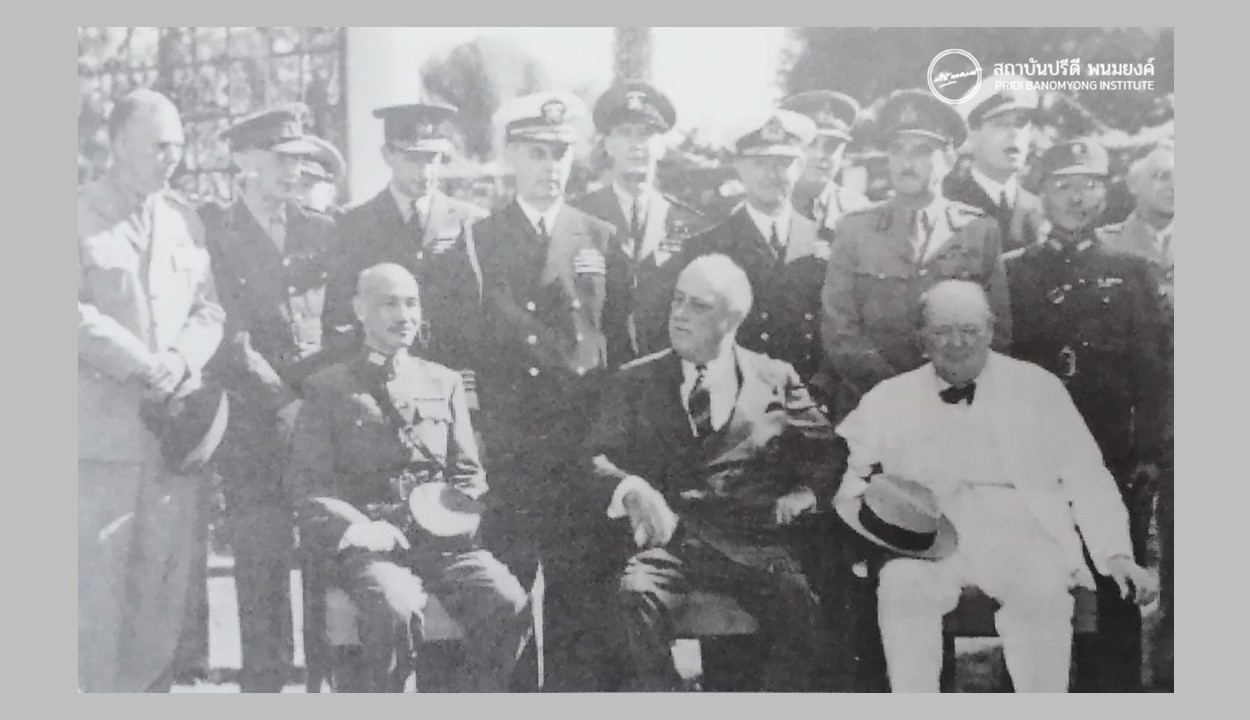
(แถวนั่งจากซ้ายไปขวา) ประธานาธิบ จอมพลเจียง ไคเชคแห่งสาธารณรัฐจีน ประธานาธิบดีแฟรงกลิน ดี. รูสเวลท์แห่งสหรัฐอเมริกา และนายกรัฐมนตรี วินสตัน เชอร์ชิลล์แห่งราชอาณาจักร ในการประชุมของสัมพันธมิตร ณ กรุงไคโร พ.ศ. 2488
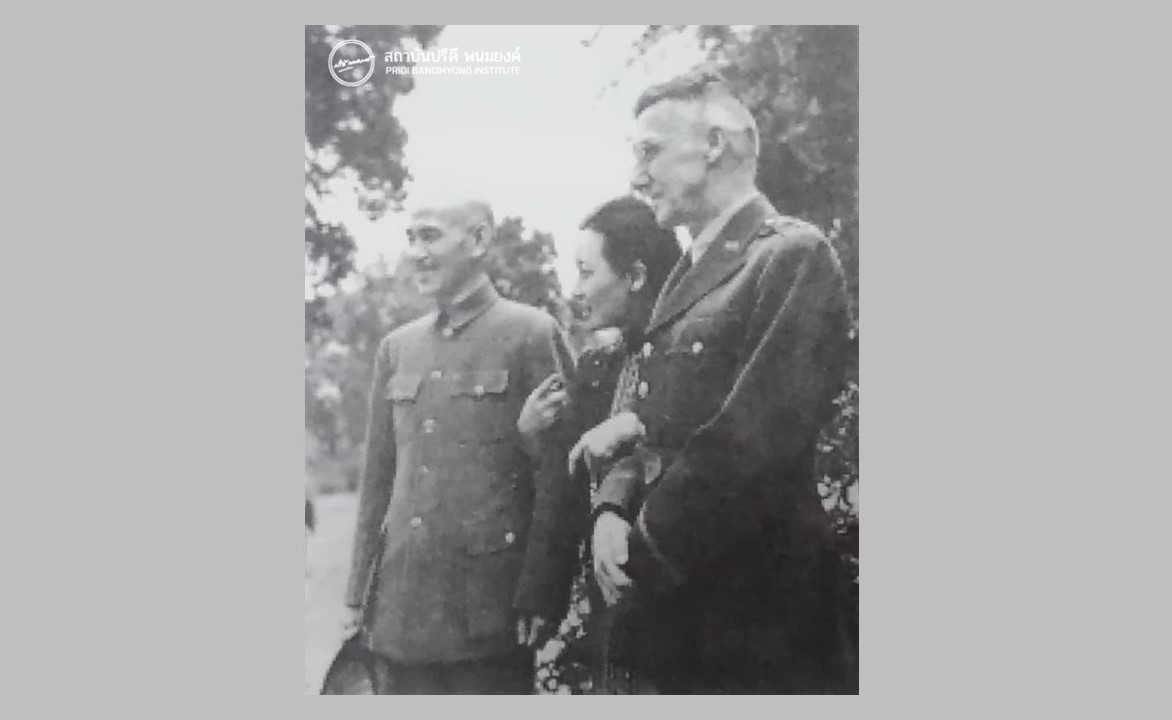
จอมพลเจียง ไคเชค กับมาดามเจียง ไคเชค และนายพลโจเซฟ พี. สติลเวลล์ ผู้บัญชาการทหารสหรัฐอเมริกาในจีน, พม่า และอินเดีย ถ่ายที่ประเทศพม่า เมษายน 2486
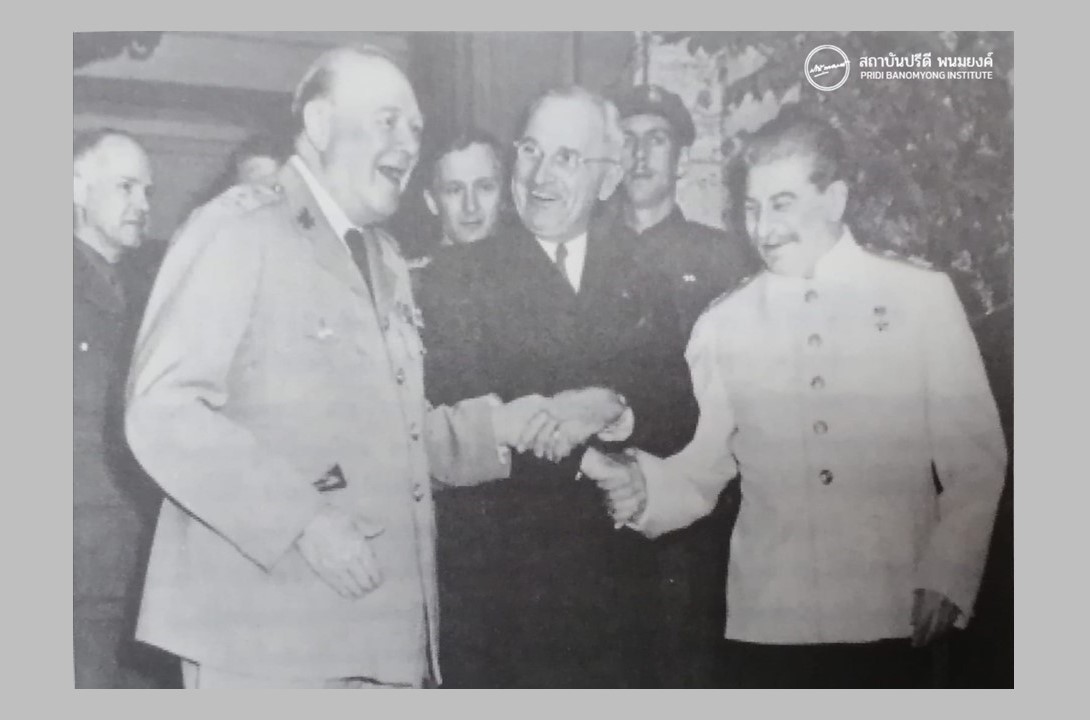
ผู้นำสามชาติมหาอำนาจในการประชุมที่ปอตสดัมใกล้กรุงเบอร์ลิน ประเทศเยอรมนี เดือนกรกฎาคม พ.ศ. 2488 หลังจากสัมพันธมิตรพิชิตเยอรมันเรียบร้อยแล้ว
(จากซ้าย) วินสตัน เชอร์ชิลล์ นายกรัฐมนตรีอังกฤษ, ทรูแมน ประธานาบดีแห่งสหรัฐอเมริกา และโจเซฟ สตาลิน ผู้นำแห่งสหภาพโซเวียต
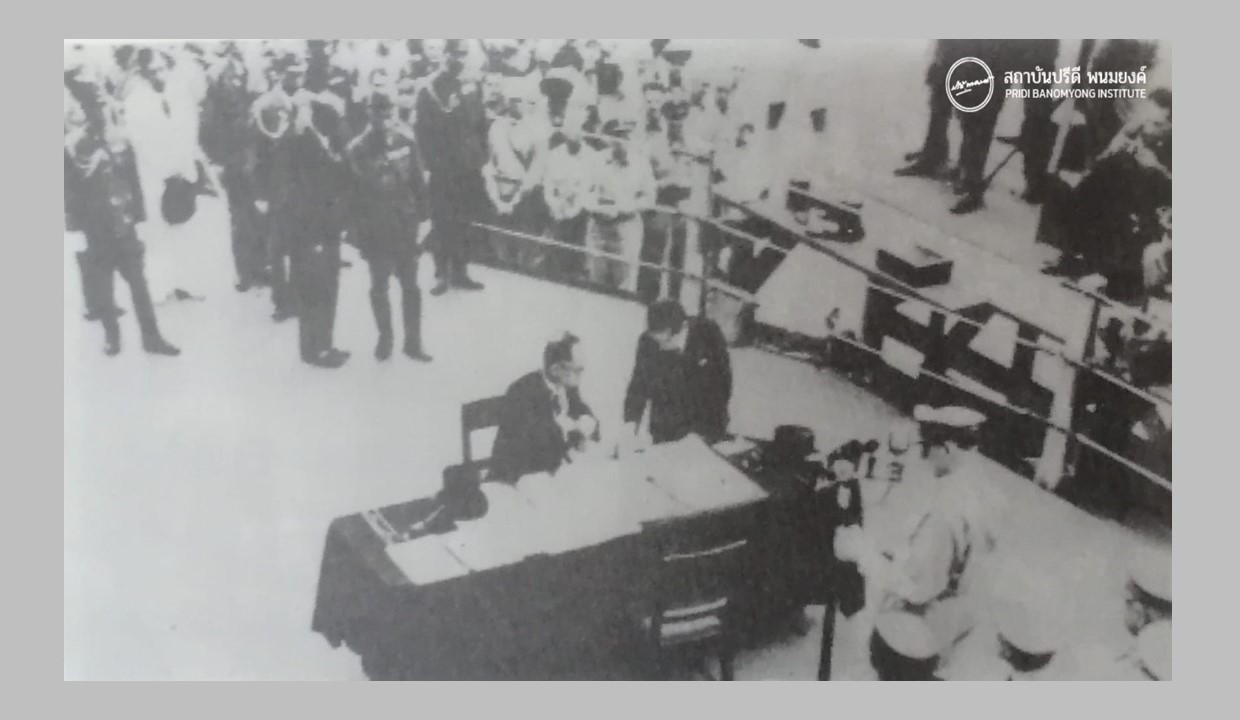
วันที่ 2 กันยายน 2488 นายมาโมรุ ชิเกมิตซุ รัฐมนตรีว่าการกระทรวงต่างประเทศญี่ปุ่น ลงนามในสัญญายอมแพ้ซึ่งจัดขึ้นบนดาดฟ้าเรือประจัญบานมิสซูรี ขณะที่พลเอกดักลาส แมคอาร์เธอร์ กล่าวประกาศพิธียอมแพ้ และลงนามในสัญญาทางวิทยุกระจายเสียง
หมายเหตุ:
- คงอักขรและวิธีสะกดตามต้นฉบับ
- ภาพประกอบจากหนังสือโมฆสงคราม บันทึกสัจจะประวัติศาสตร์ที่ยังไม่เปิดเผยของรัฐบุรุษอาวุโส ปรีดี พนมยงค์
เอกสารอ้างอิง
- ปรีดี พนมยงค์, “ท่าทีของสัมพันมิตรต่อประเทศไทย” ใน โมฆสงคราม บันทึกสัจจะประวัติศาสตร์ที่ยังไม่เปิดเผยของรัฐบุรุษอาวุโส ปรีดี พนมยงค์ (กรุงเทพฯ: มูลนิธิปรีดี พนมยงค์, 2558), น. 251-265.
